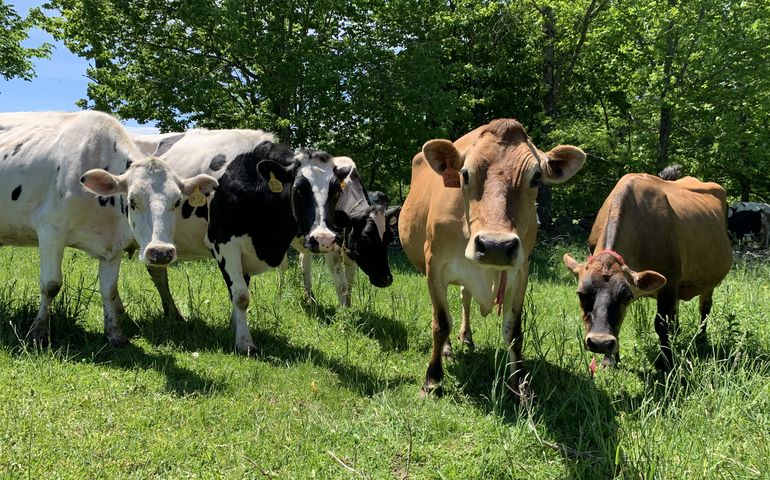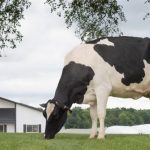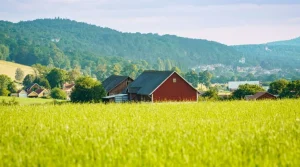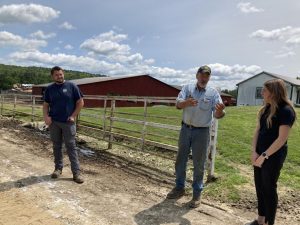
In a letter sent to the Maine farmers and 65 others throughout the Northeast, Danone said their contracts will end on Aug. 31, 2022.
Dairy goods, Maine’s second-largest agricultural products, have faced rising production costs and falling consumer prices for years. This latest blow, which affects farms accounting for 7% of the state’s dairy production, is likely to have a ripple effect on local economies and farm-related businesses.
“Maine has a small, tight-knit dairy community, so when 14 of your dairy farms lose their milk market and are in danger of not being able to continue to operate, it’s a crushing blow,” said Jami Badershall, spokesperson for the Maine Dairy Promotion Board and Maine Dairy & Nutrition Council.
Milk is Maine’s largest livestock product and second only to vegetable crops in agricultural sales, according to the latest U.S. Department of Agriculture census in 2017. Maine’s 27,000 dairy cows produced 593 million pounds of milk, which was $1.15 million in sales in 2020.
Most of these farms are located in the state’s “dairy belt” in southern central counties.
Badershall said that few recognize the economic contributions dairy makes to the state and added she hopes a solution can be found “that will allow this milk to find a home with another processor and these families can continue to farm.”
It’s unclear what other options are available for the affected farmers, since Maine does not have an in-state processing plant for organic milk. All organic milk is either processed at a small scale for value-added products like artisan cheese and ice cream, or must be shipped out of state for processing.
Other organic milk producers that buy from the state, like Stonyfield and Organic Valley, may not have a need for more producers.
News of the contract terminations brought concern from both state and federal leaders who are looking into supports.
The Maine Department of Agriculture, Conservation and Forestry has begun reaching out to the affected farms and exploring ways to assist them, including forming a working group to discuss both short- and long-term remedies, according to a joint statement by Gov. Janet Mills and MDACF commissioner Amanda Beal last week.
The group will be made up of state congressional delegates and agriculture industry stakeholders, including the Maine Dairy Industry Association, Maine Organic Milk Producers, Maine Organic Farmers and Gardeners Association, University of Maine Cooperative Extension, Maine Farmland Trust, Coastal Enterprises, Inc, Maine Farm Bureau and Maine Milk Commission.
U.S. Rep. Chellie Pingree, D-Maine 1st District, who has been an organic farmer for decades, also expressed concerns. “I am working with the Maine delegation and state leaders to identify the best path forward for these producers and the sector as a whole after this disappointing news and stand ready to provide any assistance at the federal level that we can,” Pingree told Mainebiz.
Part of a larger trend
Maine, along with other states like Vermont, which had 28 contracts terminated by Danone in the same round, has seen a decline of dairy farmers over the years.
In 1954 there were 4,578 dairy farmers, down to 286 in 2017, according to a Maine Farmlands Trust report. The report sites challenges related to rising production costs, declining or volatile milk prices, an aging farmer population and farmland demographic shifts for the 16% decrease.
Maine’s organic dairy sector may be shrinking at a great rate.
It has been left hanging by Horizon Organic before. In 2018 Horizon Organic, which was bought by Danone five years ago, decided not to renew contracts with dairies who were producing milk for both Horizon and their own value-added products, eight in total.
That could be a blueprint for the current affected farms, but it won’t be an easy road.
“Most of the farms that lost Horizon contracts had to retool and find ways to utilize their milk in local markets/value-added on-site processing,” executive director of the Maine Dairy Industry Association Julie-Marie Bickford recalled in a Maine dairy industry update webinar presented by the Maine Organic Farmers and Gardeners Association last year.
Some of the affected farms went out of business or slashed herd numbers, while Organic Valley picked up a few of the contracts.
Thomaston’s Grace Pond Farm, which shipped milk to Horizon Organic along Grace Pond’s own dairy products, scrambled to find new partners for supply. The farm found new producers, like Swallowtail Creamery and Fuzzy Udder Creamery, but not without heavy investment in shipping equipment and increased land-base to grow their herd to make the numbers work. Grace Pond is one of the smallest licensed milk haulers in the state and the only organically certified one trucking directly to creameries.
Lack of infrastructure for processing continues to be one of the most pressing issues for farm businesses across the state, according to a study conducted this summer in partnership with the University of Maine Extension.
None of the affected farmers responded immediately to requests for comment from Mainebiz, but other dairy farmers expressed their concerns for their fellow farmers and the farming community as a whole.
“Danone and Horizon’s decision to strand the milk of 14 Maine dairy farms adds even more uncertainty to our dairy community as well as threatens the tightly woven fabric of our dairy related economies and infrastructure,” said Jenni Tilton-Flood, a Clinton dairy farmer who produces milk under the Cabot Creamery Cooperative and serves on several dairy-related boards.
Representatives at Danone did not respond to requests for comment for this story, but said in a statement to the Food & Environment Reporting Network’s Ag Insider, “We … did not make this decision lightly. Growing transportation and operational challenges in the dairy industry, particularly in the Northeast, led to this difficult decision. We will be supporting new partners that better align with our manufacturing footprint.”
Danone (OTCQX: DANOY), based in Paris, France, reported revenue of over 25 billion euros in 2019 and employed over 102,000 people worldwide.
























